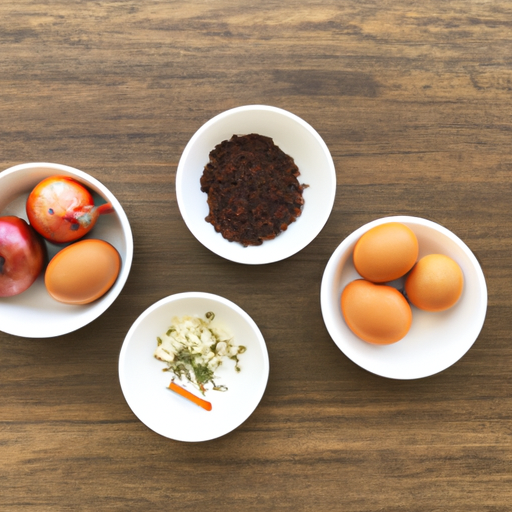Welcome to Omelette Recipes! Today, we’re exploring the delicious flavors of Morocco with this easy-to-make Moroccan egg recipe. With a blend of aromatic spices and silky eggs, this dish is perfect for breakfast, lunch, or dinner. Let’s get started! We’ve made this moroccan egg recipe easy to follow 👨🍳.

Ingredients
- 4 large eggs
- 1 small onion, finely chopped
- 2 cloves garlic, minced
- 1/2 teaspoon ground cumin
- 1/2 teaspoon smoked paprika
- 1/2 teaspoon ground coriander
- 1/4 teaspoon ground turmeric
- 1/4 teaspoon cayenne pepper
- 2 tablespoons olive oil
- 1/2 cup canned tomatoes, diced
- Salt and pepper, to taste
- Fresh parsley, chopped, for garnish
Instructions
- In a large skillet over medium heat, cook the onion and garlic until soft and translucent, about 5 minutes.
- Add the cumin, smoked paprika, coriander, turmeric, cayenne pepper, and olive oil to the skillet. Stir to combine and cook until fragrant, about 1 minute.
- Stir in the canned tomatoes and their juice. Reduce the heat to low and simmer for about 10 minutes, stirring occasionally.
- Using a spoon, make four wells in the tomato sauce.
- Crack an egg into each well.
- Cover the skillet and cook until the egg whites are set and the yolks are cooked to your liking, about 5-8 minutes.
- Season with salt and pepper, and garnish with chopped fresh parsley.
- Serve immediately.

How long does moroccan egg last in the fridge?
Moroccan eggs, also known as shakshuka, can be stored in an airtight container in the fridge for up to three days after cooking. It is important to allow the eggs to cool completely before storing them in the fridge. To reheat, simply place the egg dish in a preheated oven or microwave until the eggs are heated through. It is not recommended to freeze shakshuka as the eggs will become a bit watery when thawed, which may affect the texture of the dish. As with any leftovers, it’s important to use your own judgement when consuming them. If the eggs smell or taste off, it’s best to discard them.
Low calorie moroccan egg recipe substitutions
To make this Moroccan eggs recipe lower in calorie, there are several substitutions that can be made. First, instead of using olive oil to cook the onion and garlic, a non-stick cooking spray or a tablespoon of vegetable broth can be used to reduce the amount of added fat. Secondly, reducing the amount of canned tomatoes and using fresh tomatoes instead can also help to lower the calorie content of the dish. Additionally, using only egg whites instead of whole eggs can further lower the calorie count. Finally, using a smaller amount of spices or reducing the amount of added salt can also help to reduce the calorie content. With these substitutions, the dish can still be flavorful and enjoyable while being lower in calorie.
What to serve with a moroccan egg?
Moroccan eggs, also known as shakshuka, are a delicious and hearty breakfast or brunch dish. They are typically served with crusty bread or pita to scoop up the rich tomato and egg mixture. Other traditional sides include olives, harissa, and fresh herbs such as mint or cilantro. For a more substantial meal, you can also serve Moroccan eggs alongside a simple salad or roasted vegetables. The combination of savory and spicy flavors make this dish a crowd-pleaser that’s sure to satisfy.
Whats the best sauce for a moroccan egg?
The best sauce for Moroccan egg is Harissa. This spicy and flavorful red chili pepper paste is traditionally used in Moroccan cuisine to add heat and depth to dishes. To make Harissa, simply mix dried red chili peppers with garlic, cumin, coriander, and olive oil in a food processor until smooth. Harissa pairs perfectly with Moroccan egg, which is typically seasoned with cumin, paprika, and other spices. Drizzle the Harissa sauce over the egg for a delicious and authentic Moroccan breakfast or brunch experience.
Moroccan egg health benefits
Moroccan eggs, also known as shakshuka, can offer several health benefits depending on how they’re prepared. Eggs are an excellent source of protein, vitamins D and B12, and minerals like selenium and choline. Moroccan eggs are typically prepared with a tomato-based sauce, which is high in antioxidants like lycopene and vitamin C. However, some recipes may add extra salt or sugar, which can detract from the overall health benefits. For a healthier alternative, I would recommend a quinoa salad with roasted vegetables and a lemon vinaigrette. This recipe would provide a nutrient-packed meal filled with fiber, vitamins, and minerals.
Post | Title | Ratings | Link |
 | Turkey and Cheese Omelette | ||
 | Goat Cheese and Tomato Omelette | ||
 | Tomato and Mozzarella Omelette |
















